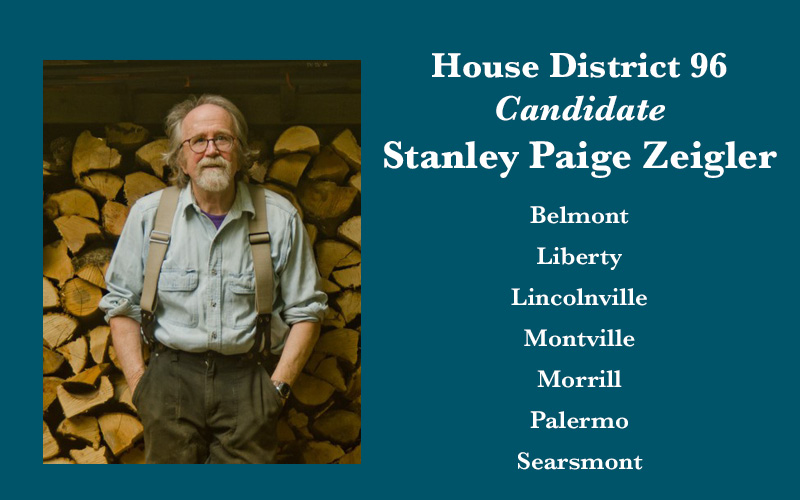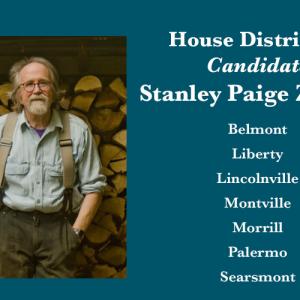On the issues: House District 96 Candidate Stanley Paige Zeigler
Penobscot Bay Pilot has posed questions to each candidate running for Maine State Legislature, providing the opportunity for the public to better understand their position on issues important to the state. Candidates responding with their individual written answers will have their responses stored in the Pilot’s 2020 Election Resource Guide. Stanley Paige Zeigler, Democrat, is seeking reelection to House District 96, which includes Belmont, Liberty, Lincolnville, Montville, Morrill, Palermo and Searsmont.
1. Please provide a concise biography of yourself.
Personal: Married, daughter
Where I have lived: Mt. Desert, Calais, T1R3, Troy, Athens, Skowhegan, Portland, S. Portland and finally Montville where I have been building my home and paying property taxes since 1985
Education: I have a BA from Dickinson College, an AA from SMCC in Navigation, a 6 mos. “Completion in Wood Harvesting” from WCCC, education courses from UM Farmington and attended Graduate School at Maine Maritime Academy for Maritime Management.
Work history: factory maintenance, apprentice mechanic and road crew work in high school and college. After college: Maine ambulance attendant and operating room orderly, darkroom worker, professional logger, special ed. teacher, night counselor at a drug rehab center, Resident Director at SMCC, Unlimited Master in the U.S. Merchant Marine and Maine State Legislator.
2. What are the three most pressing issues facing Maine, as a state, today, and how would you like to see them resolved?
Three most pressing problems, all of equal importance:
1. Cost of healthcare, availability of providers, senior care and substance abuse.
2. Education and workforce development
3. Climate issues and protection of Maine's environment
3. How will you protect the local (municipal) taxpayer as you help shape a state budget?
There are many claims on property taxes that need to be shifted to the state. Property taxes are hard on Maine workers and seniors, as your property tax is not tied to your income. The first is municipal sharing, which needs to be returned to the 5% that was reduced in the last administration. The second is to increase the state's contribution to education to achieve the 55% funding that was approved by the voters. The third is for the state to pay its fair share of county jail costs. Those costs are currently covered by the property taxes from the towns in each county.
4. Given the shortfall of housing in your district, how should the state approach the need for more workforce housing, as well as re-entry housing for the formerly incarcerated, and emergency shelter for those suffering through extended power outages?
We have a waiting list of 20,000+ for vouchers and about the same for affordable housing units. Due to Covid, there are over 63,000 Mainers who missed their rental and mortgage payments in July. Our state only invests less than .01% of our budget in housing. Yet this is an important part of people dealing with recovery and reintegration into society after prison. If we don't want them to go back, which will cost more in many ways, we need to invest in housing. We can look at including the private sector as there is not enough housing in the public sector. Another way is to incentivize low income housing in municipal TIFs (Tax Increment Housing) with state funds. The other part of your question is about emergency housing. I heard that there has been a movement to use failed box stores in shopping malls, the use of public buildings not currently in use and the Bank of America complex in Belfast.
5. What legislative committees would you like to serve on and why?
I currently serve on the Environment and Natural Resources Committee, but would also like to be on Energy, Utility and Technology or Transportation.
6. Maine’s economy relies on small and micro-businesses. How will you help the entrepreneur succeed in this state, especially given the pandemic?
There are always three ways to help any business. The first is infrastructure, whether it be roads, broadband, energy or medical support. The second is developing a workforce through education. And third would be tax incentives for start ups that use Maine workers. We have used these in the past and we need to look at them and make sure they actually employ local workers and have a viable business plan.
7. What is your vision for affordable health care?
The only way we can have affordable healthcare is by first developing a large enough pool of people being insured. The larger the number, the less expensive the cost of insurance. Right now the costs of private health insurance includes about 25% administrative costs. That needs to be reduced. The other way is to look at the actual costs of procedures. People suggest that you shop around for those medical procedures by their costs. While costs do vary between providers, often people are not in a position to take the time to research this. And while you may find a procedure is less costly in Portland, if you live in Fort Kent it becomes more of a problem than just cost differences. We need transparent medical costs. Medicare needs to update its pay structure to keep abreast of new technology that reduces or eliminates hospital
stays.
8. Does the State of Maine need to improve its public health system?
Maine does need to improve its public health system. Rural hospitals are having financial problems and Covid-19 has increased those problems by increasing costs and reducing revenues due to cancellations of elective surgery. In talking with my doctor, I found that the hospital he is associated with went from being in the black to red. No new improvements can be funded for years. Telemedicine connected to strong broadband is a necessity. Also needed are incentives for young doctors to relocate to rural areas. Rural emergency services are facing problems with their sources of funding and a shrinking pool of volunteers. Problems do have solutions and we are working on them in the legislature.
9. What are the greatest strengths in your district, and how do you hope to support them?
Of course the greatest strength of any district is its people. And that is true here, too. The next strength is its natural resources, which for us are the woods, lakes, shore line and hills which bring tourists, camp goers and sports loving people. Another strength lies in the ability of people to grow their own food. We have a diverse and beautiful district! I have sponsored or cosponsored bills to protect small farms, the cleanliness of our waters, reduce pollution, protect pollinators, reduce property taxes, support education and provide services to reduce substance abuse. There is far more to do and I hope to be in Augusta to continue this important work.
10. What are the greatest problems to address in your district, and how do you intend to address them?
The greatest issues in our district are the lack of local jobs, having to commute over an infrastructure needing repair, lack of broadband, medical costs, educational availability, aging housing stock and invasive species effecting our lakes and woods. These issues can be overcome, but they need state assistance.
11. What is your position on law enforcement reform in the State of Maine?
Our district has to use county and state police because we don't have local police force. Because of that, there are sometimes long waits for assistance. We can't afford to have less of a police presence. One of the reasons that wait times may be longer is that we ask the police to do more than their motto which is to “Protect and Serve” We expect them to perform functions outside of their scope. They shouldn't be dealing with mental health issues. If we fully fund state agencies, the support will be there to reduce their workload. We had a bill in the legislature for hub mental health services that would be available 24/7 to assist the police. That should be funded. We shouldn't be asking them to do the business of fining people to pay for municipal government. In the last 40 years we have increased incarceration for nonviolent crimes. They could be handled outside of prison with a restorative justice program. We need to keep funding the police so that our highways and homes are safe. That said, there are other issues. The job of the police is hard, the hours are long and we need to show those who respect us, the respect that they deserve. Community policing where all people feel as if they are respected regardless of class or color is a must. There will always be tensions in society, but we have to keep on striving for improvement.
12. What are your thoughts about the state’s response to the pandemic?
I come from a tradition that in times of impending emergencies you look to a leader. When I sailed first time as Captain there was a typhoon approaching in an incredibly remote area in the South Pacific. As Captain, I had to look at typhoons' paths to see where ours might intersect and place the ship and my crew and passengers in the safest position. I turned to my crew and told them what I was planing to do and could they do what I asked of them. Once they understood their jobs, it was my responsibility to make the decisions. That is what the legislature did with Governor Mills when we gave her emergency powers. She turned to medical professionals for advice and made hard decisions. People called for us to come back into session. You don't need 186 voices on each decision. You need good leadership and strong support or there would be no forward momentum. Businesses and people were hard hit. The state along with the federal government stepped in with loans, grants and unemployment supplements. Still, people were in Augusta demonstrating to re-open. Yet in states that opened prematurely, it has been even more damaging to the economy and cost a greater number of people's lives. Wearing masks and physical distancing have been proven to be effective.
13. Do you support construction of the 145-mile Central Maine Power transmission line from Quebec to Massachusetts?
I have been skeptical of the transmission line construction from the beginning and was disappointed that the we can't have a public vote on it. HydroQuebec has not been forth coming regarding their sources of power. Will they shift their sources of power to fossil fuels for New York so that Massachusetts receives the electricity from hydro? If so, this does not reduce the environmental impact. Is Maine really getting a good deal? What I would like to see is that CMP becomes a public utility owned by its ratepayers. Then we would have more public input on whether the corridor is good for Maine and good for the environment.
14. Free space! Is there anything else you want voters to know about you or your vision not addressed through this questionnaire?
I want to thank our local newspapers (both paper and virtual) for being able to produce local news. You give the voters the information they need to make informed decisions.
Event Date
Address
United States





























